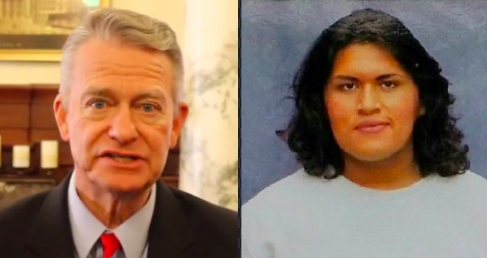Republican governor behind the most transphobic laws in the US launches Supreme Court bid to deny trans prisoner surgery

Governor Brad Little is still fighting Adree Edmo’s gender-affirmation surgery – despite it having already happened.
Idaho governor Brad Little, the person responsible for some of America’s most transphobic laws, has appealed to the Supreme Court to avoid paying for a transgender inmate’s gender confirmation surgery.
Little filed a petition after being ordered to provide surgery for 31-year-old Adree Edmo, a trans woman who is being housed in a men’s facility in Idaho.
She is serving 10 years for sexually abusing a 15-year-old boy when she was 22, and is not eligible for parole.
Edmo was diagnosed with gender dysphoria while in prison and her condition has grown so severe that she has reportedly attempted to castrate herself twice.
Denying trans woman surgery ruled ‘cruel and unusual’.
Last year a court of appeals upheld a previous ruling that denying Edmo the surgery constitutes cruel and unusual punishment.
But Little is appealing the ruling for a second time as he insists that he “should not have to pay for a procedure that is not medically necessary”.
He has vowed to “vigorously litigate” the ruling by taking it to the country’s highest court after the Ninth Circuit Court refused his request to hear the case for a third time.
“The Ninth Circuit’s decision goes against the text and original meaning of the Eighth Amendment and contradicts more than four decades of Supreme Court precedent,” Little said in a release.
“We will vigorously litigate the Ninth Circuit’s unprecedented ruling at the Supreme Court because the taxpayers of Idaho should not have to pay for a procedure that is not medically necessary.”
Idaho governor Brad Little’s anti-trans crusade
The state of Idaho is currently being sued by two human rights organisations thanks to a virulent anti-trans campaign spearheaded by Republican governor Brad Little.
In the midst of a pandemic, the governor signed two laws that campaigners say effectively make transgender people second-class citizens.
The first, HB509, bans transgender people from changing the gender on their birth certificates, flouting a previous a federal court ruling on the issue.
It asserts that the state will prohibit any changes to gender markers and only recognise a so-called “biology-based definition of sex” based on “immutable biological and physiological characteristics, specifically the chromosomes and internal and external reproductive anatomy”.
The second bill, HB500, bans schools and colleges from letting transgender girls from taking part in girls’ sports.
Under the “mean-spirited” law, girls whose sex is “disputed” will be required to subject themselves to invasive testing to show medical evidence of their “internal and external reproductive anatomy”.
In addition, pupils who believe they have been “disadvantaged” by their transgender classmates will be able to sue their schools for damages.

